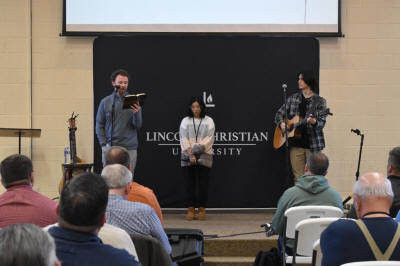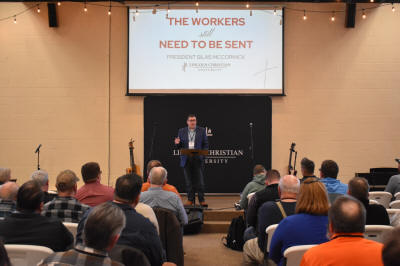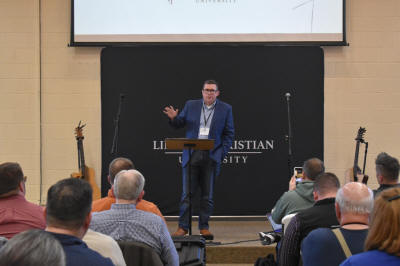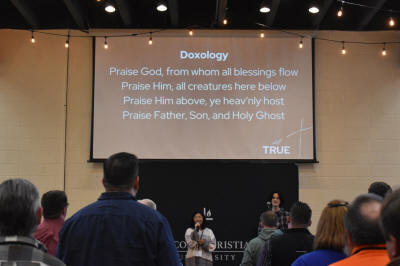 Lincoln
Christian University (LCU) hosted nearly 200 women and men in
ministry at its final Church Leaders Conference on February 17
before it closes its doors May 31. The theme of the conference was
“Still True” and featured three main sessions and two workshop
sessions. Lincoln
Christian University (LCU) hosted nearly 200 women and men in
ministry at its final Church Leaders Conference on February 17
before it closes its doors May 31. The theme of the conference was
“Still True” and featured three main sessions and two workshop
sessions.
The first session was entitled “The Nations Still Need to Be
Reached” with speaker Matt Proctor, President of Ozark Christian
College (OCC). OCC will be endowed with several of the programs and
degrees currently offered at Lincoln Christian Seminary. The new
iteration of the seminary will be called The Lincoln Seminary at
Ozark Christian College.

A team of musicians from OCC also led worship and
singing to begin the main sessions.
The second session was a panel discussion entitled “The Bible Still
Needs to Be Taught” with panelists from both LCU and OCC. The panel
included Proctor, Dr. Silas McCormick, LCU President, Dr. J. K.
Jones, LCU Professor Emeritus, Dr. Chad Ragsdale, Executive Vice
President of OCC, and Dr. Mark Scott, Online and Graduate Studies
Professor at OCC.
After a provided lunch, participants had the option to attend one of
seven workshops, followed by an opportunity to attend a second of
the repeated workshops in a second session. Workshops included “The
Bible Still Needs to Be Preached” by Dr. Jones and Dr. Scott, “The
Culture’s Worldview Still Needs to be Engaged” by Dr. Ragsdale, “The
Church Still Needs to Worship Corporately” by Isaac Schade of Ozark
Christian College, “The Elders Still Need to Lead Well" by Greg
Taylor and the Elders of Second Church of Christ, Danville, IL, “The
Believers Still Need to Be Discipled” by Tracy Thomas of Second
Church of Christ, Danville, IL, “The Ministers Still Need to Be Good
Stewards” by Drs. Anna McCormick and Silas McCormick, and “The Older
Generation Still Needs to Be Cared for– and Called” by Mike Harney
of West Side Christian Church, Springfield.

The final session was entitled “The Workers Still
Need to Be Sent” presented by President McCormick. He began his
sermon with the idea that we all need people to check in on us,
people that we trust and who are authentic. He thanked the attendees
for checking in on him and the university. He said that speaking
this day was “an awful privilege,” referencing the closure of LCU
and the attendant grief mingled with gratitude and hope for the
future and for the legacy of LCU. McCormick stated, however, that he
did not want to talk about the past, but to look to the future. He
based his forward-looking sermon on the text from the New Testament
book of Acts chapters 15 and 16 about the missionary journeys of the
apostle Paul.

McCormick’s first point was that Making Disciples
Starts with Me Right Now. He cited a book co-written by Drs. Wayne
Shaw and James Strauss, well-known LCU professors, about
discipleship. They wrote that Christians seem to wait for something
like money, an invitation, or a sign of some kind to begin inviting
others into a relationship with Christ, but Paul understood the
times and the calling. He knew the time was always ‘right now.’
McCormick spoke about the general worry about the “the ministry
pipeline,” meaning where will the next generation of ministers come
from? Christians have to both BE better disciples and MAKE better
disciples.
|

McCormick’s second point was Making Disciples is
Messy. The book of Acts chapter 15 records a dispute between Paul
and Barnabas over whether to bring Mark on their missionary journey,
although he had deserted them before. This disagreement led to a
split. Paul continued on to Syria with Silas, while Barnabas went to
Cyprus with Mark. McCormick noted that most sermons identify the
lesson of this passage as “God doubled the manpower,” however this
point comes at the end of the story. Often sermons gloss over the
fact that the situation starts messy and ugly. The start of the
story is devastating personal loss. Loss and adversity are not
abnormal. There is no way to avoid all risks.
The third point of McCormick’s sermon was Making Disciples Requires
Perpetual Leadership Renewal. While on his journey, Paul recruited
Timothy for vocational ministry, but not at random. The believers
who knew him spoke well of Timothy. McCormick asked, “Do our own
churches create spaces for the development of future leaders? Are
there opportunities for young people and new believers for service
whether done well or poorly? Is there encouragement to go into
ministry?” McCormick stated that he has frequently and even recently
heard the phrase, “You don’t have to be in the pulpit to do
ministry.” McCormick’s response is, “But you might.” He said that he
could not tell a room full of people that no one there will not be
needed or called to vocational ministry even with the prospect of
poor compensation, lack of family support, or other hardships.
McCormick identified an historical cycle of older generations not
making way for new leadership because the next generation is not
there. How do we break this cycle?

McCormick’s final point was Making Disciples Requires
Following the Leading of the Holy Spirit. He said church leaders
should ask themselves: Am I reading the Bible? Am I praying? What
space is the church leaving for the Holy Spirit? He also stated that
“Sometimes God says ‘No’ to good, faithful people trying to serve
him.” Maybe it’s not the right time or place, or maybe we never know
why. Are we looking for where the Holy Spirit is working? McCormick
noted that “If we make the wrong choice after seeking God’s voice,
he will let us know,” referencing Acts chapter 16, verse 10 in which
Paul has a vision of a man from Macedonia begging for him to come
and help, even though his group was not initially planning to head
in that direction.
The three principles that McCormick cited to sum up his sermon were
drawn from the apostle Paul’s example: 1. Paul devotes time and
energy to making disciples. 2. Paul helps to grow disciples and to
make better disciples, 3. Paul keeps sharing the Gospel and making
more disciples. No ministry that follows these principles will fail
in its legacy.

The conference concluded with prayer and a final
hymn, Doxology (by Thomas Ken, 1674): “Praise God from whom all
blessings flow; Praise Him all creatures here below; Praise Him
above, ye heavenly host; Praise Father, Son, and Holy Ghost. Amen.”
[Stephanie Hall]

|